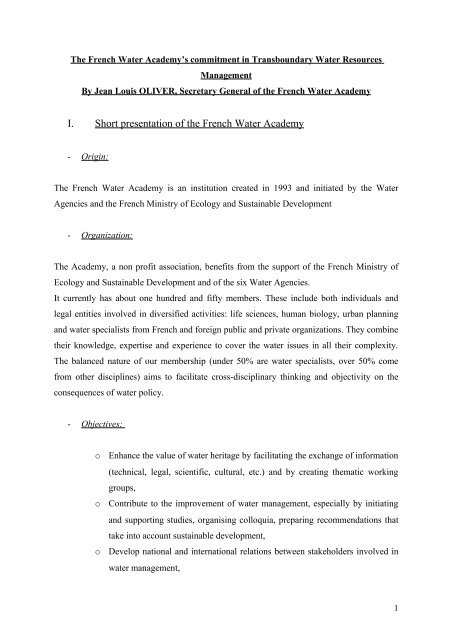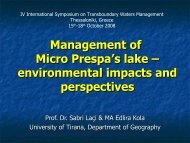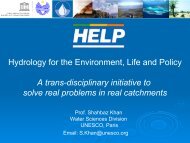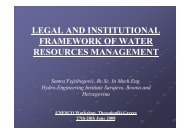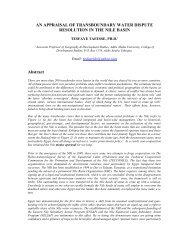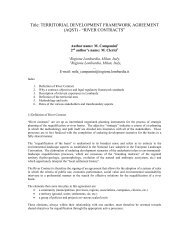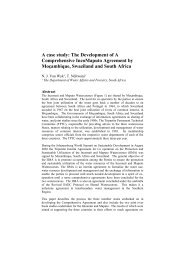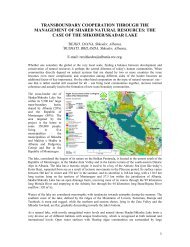The French Water Academy's commitment in Transboundary ... - inweb
The French Water Academy's commitment in Transboundary ... - inweb
The French Water Academy's commitment in Transboundary ... - inweb
Create successful ePaper yourself
Turn your PDF publications into a flip-book with our unique Google optimized e-Paper software.
<strong>The</strong> <strong>French</strong> <strong>Water</strong> Academy’s <strong>commitment</strong> <strong>in</strong> <strong>Transboundary</strong> <strong>Water</strong> Resources<br />
Management<br />
By Jean Louis OLIVER, Secretary General of the <strong>French</strong> <strong>Water</strong> Academy<br />
I. Short presentation of the <strong>French</strong> <strong>Water</strong> Academy<br />
- Orig<strong>in</strong>:<br />
<strong>The</strong> <strong>French</strong> <strong>Water</strong> Academy is an <strong>in</strong>stitution created <strong>in</strong> 1993 and <strong>in</strong>itiated by the <strong>Water</strong><br />
Agencies and the <strong>French</strong> M<strong>in</strong>istry of Ecology and Susta<strong>in</strong>able Development<br />
- Organization:<br />
<strong>The</strong> Academy, a non profit association, benefits from the support of the <strong>French</strong> M<strong>in</strong>istry of<br />
Ecology and Susta<strong>in</strong>able Development and of the six <strong>Water</strong> Agencies.<br />
It currently has about one hundred and fifty members. <strong>The</strong>se <strong>in</strong>clude both <strong>in</strong>dividuals and<br />
legal entities <strong>in</strong>volved <strong>in</strong> diversified activities: life sciences, human biology, urban plann<strong>in</strong>g<br />
and water specialists from <strong>French</strong> and foreign public and private organizations. <strong>The</strong>y comb<strong>in</strong>e<br />
their knowledge, expertise and experience to cover the water issues <strong>in</strong> all their complexity.<br />
<strong>The</strong> balanced nature of our membership (under 50% are water specialists, over 50% come<br />
from other discipl<strong>in</strong>es) aims to facilitate cross-discipl<strong>in</strong>ary th<strong>in</strong>k<strong>in</strong>g and objectivity on the<br />
consequences of water policy.<br />
- Objectives:<br />
o<br />
o<br />
o<br />
Enhance the value of water heritage by facilitat<strong>in</strong>g the exchange of <strong>in</strong>formation<br />
(technical, legal, scientific, cultural, etc.) and by creat<strong>in</strong>g thematic work<strong>in</strong>g<br />
groups,<br />
Contribute to the improvement of water management, especially by <strong>in</strong>itiat<strong>in</strong>g<br />
and support<strong>in</strong>g studies, organis<strong>in</strong>g colloquia, prepar<strong>in</strong>g recommendations that<br />
take <strong>in</strong>to account susta<strong>in</strong>able development,<br />
Develop national and <strong>in</strong>ternational relations between stakeholders <strong>in</strong>volved <strong>in</strong><br />
water management,<br />
1
o<br />
Improve public awareness concern<strong>in</strong>g water-related issues.<br />
- Ma<strong>in</strong> Activities and Projects:<br />
o<br />
<strong>Water</strong>, land plann<strong>in</strong>g and local action<br />
Integrated Methodology on water and land plann<strong>in</strong>g,<br />
<strong>Transboundary</strong> aquifers management (<strong>in</strong> partnership with UNESCO-<br />
IHP, BRGM, OIEau, AFD),<br />
Management of natural risks, namely floods,<br />
<strong>Water</strong> supply and sanitation security, especially <strong>in</strong> crisis scenarios<br />
(natural or technological catastrophes, armed conflicts, <strong>in</strong>ner<br />
disturbances, etc.) – In partnership with the <strong>French</strong> M<strong>in</strong>istry of Ecology<br />
and Susta<strong>in</strong>able Development and the <strong>French</strong> Red Cross.<br />
o<br />
<strong>The</strong> right to dr<strong>in</strong>k<strong>in</strong>g water and sanitation; <strong>in</strong>stitutional water governance<br />
o<br />
<strong>The</strong> socio-cultural dimension of water management<br />
International <strong>Water</strong> and Film Events (IWFE) – In partnership with<br />
ISW,<br />
Reference book,<br />
Participation of the general public <strong>in</strong> the development and<br />
implementation of the water policies: education, tra<strong>in</strong><strong>in</strong>g, public<br />
awareness, etc.<br />
o<br />
<strong>Water</strong>, health and environment<br />
o<br />
Contribution to water management <strong>in</strong> Mediterranean countries<br />
Technology transfers <strong>in</strong> the fields of water (and sanitation); susta<strong>in</strong>able<br />
co-development between France and Morocco – In partnership with<br />
ECRIN<br />
2
Proposals for a Euro-Mediterranean water policy – In partnership with<br />
the CGPC<br />
II.<br />
Shared management of transboundary river bas<strong>in</strong>s<br />
Between 2000 and 2003, the <strong>French</strong> <strong>Water</strong> Academy focused on transboundary river bas<strong>in</strong>s,<br />
by analyz<strong>in</strong>g 25 case studies: Rh<strong>in</strong>e, Danube, Escaut, Oder, Mekong, Nile, Senegal, Niger,<br />
Orange, Limpopo, Tigris and Euphrates, Sa<strong>in</strong>t Laurent, Rio de La Plata, Rio Grande, Syr<br />
Daria and Amou Daria, Irtych, Indus, Brahmaputra, etc.<br />
From these case studies, the <strong>French</strong> <strong>Water</strong> Academy learned useful lessons and best practices<br />
which helped create needed guidel<strong>in</strong>es <strong>in</strong> order to develop the shared management of<br />
transboundary surface water.<br />
<strong>The</strong> useful lessons learned from these case studies concern namely the conditions that lead to<br />
the necessary dialogue between riparian states. <strong>The</strong>se conditions are as follows:<br />
- response to crisis situations and natural catastrophes<br />
- the realisation that non-concerted solutions are either very costly or impossible to<br />
atta<strong>in</strong><br />
- end used pressure to <strong>in</strong>crease available resources<br />
- compliance with <strong>in</strong>ternational law and the 1997 rules set out by the United Nations<br />
- the conditions and obligations imposed by the f<strong>in</strong>ancial backers before provid<strong>in</strong>g<br />
fund<strong>in</strong>g<br />
- the resolution of latent conflicts between parties that lead to the reduction or the<br />
deterioration of shared water resources.<br />
This work led to the creation of a special section for transboundary water resources with<strong>in</strong> the<br />
International Network for Bas<strong>in</strong> Organizations (INBO), which is <strong>in</strong> close cooperation with the<br />
International Office for <strong>Water</strong> (IOW).<br />
III.<br />
Shared management of transboundary aquifer systems<br />
3
In 2006, the <strong>French</strong> <strong>Water</strong> Academy shifted its focus on transboundary aquifer systems,<br />
start<strong>in</strong>g with the ones that France shares with its neighbour<strong>in</strong>g countries: Germany,<br />
Switzerland, Belgium (Flanders and Wallonia).<br />
In February 2007, an <strong>in</strong>ternational conference was organized at Tournai (Belgium) aimed at<br />
develop<strong>in</strong>g a shared (franco-belgian) management of the transboundary underground water<br />
resources.<br />
<strong>The</strong> <strong>French</strong> <strong>Water</strong> Academy is currently work<strong>in</strong>g <strong>in</strong> close cooperation with the <strong>French</strong><br />
Development Agency (FDA), UNESCO-IHP, BRGM and IOW, <strong>in</strong> order to propose the tools<br />
and guidel<strong>in</strong>es that are needed <strong>in</strong> order to develop the shared management of transboundary<br />
aquifer systems.<br />
<strong>The</strong> <strong>French</strong> <strong>Water</strong> Academy and its partners will start by mak<strong>in</strong>g a general analysis of the<br />
current situation concern<strong>in</strong>g the shared management of transboundary aquifer systems. Dur<strong>in</strong>g<br />
this phase, the partners shall identify:<br />
- the ma<strong>in</strong> transboundary aquifer systems of the world,<br />
- the ma<strong>in</strong> actors <strong>in</strong> this doma<strong>in</strong>,<br />
- the current work that is undertaken on a political and technical level,<br />
- the ma<strong>in</strong> treaties, and other <strong>in</strong>struments, deal<strong>in</strong>g with the subject,<br />
- the difficulties and the stakes (economic, environmental, political, cultural, etc.),<br />
ma<strong>in</strong>ly <strong>in</strong> Africa and the Mediterranean region, etc.<br />
A more detailed analysis will then be undertaken concern<strong>in</strong>g a number of crucial cases <strong>in</strong><br />
Africa and the Mediterranean bas<strong>in</strong>. This second phase will start with a description of the<br />
concerned aquifer system, as well as of the environmental, socio-economic and cultural<br />
contexts. <strong>The</strong> partners will then determ<strong>in</strong>e the state of knowledge <strong>in</strong> the studied region, as<br />
well as the publics’ awareness/perception of the resource at stake and of its transboundary<br />
character.<br />
After these prelim<strong>in</strong>ary steps, the partners will then propose a number of tools and guidel<strong>in</strong>es<br />
that are necessary for a successful co-management of transboundary aquifer systems. <strong>The</strong>se<br />
tools will take <strong>in</strong>to account the socio-economic, the f<strong>in</strong>ancial, the legal, the cultural and the<br />
<strong>in</strong>stitutional aspects and will thus be adaptable to the specific local conditions of each shared<br />
aquifer system.<br />
4
<strong>The</strong> end result of this project will be found <strong>in</strong> a guide dest<strong>in</strong>ed for the decision-makers, as<br />
well as <strong>in</strong> two handbooks, the first deal<strong>in</strong>g with technical issues and the second with the legal<br />
aspects of the shared management of transboundary aquifer systems.<br />
This work will mobilize the <strong>French</strong> <strong>Water</strong> Academy and its partners for some time and will,<br />
we hope, help develop the knowledge of shared management of transboundary aquifer<br />
systems.<br />
5


